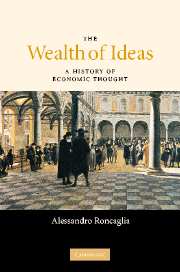Book contents
- Frontmatter
- Contents
- Preface
- 1 The history of economic thought and its role
- 2 The prehistory of political economy
- 3 William Petty and the origins of political economy
- 4 From body politic to economic tables
- 5 Adam Smith
- 6 Economic science at the time of the French Revolution
- 7 David Ricardo
- 8 The ‘Ricardians’ and the decline of Ricardianism
- 9 Karl Marx
- 10 The marginalist revolution: the subjective theory of value
- 11 The Austrian school and its neighbourhood
- 12 General economic equilibrium
- 13 Alfred Marshall
- 14 John Maynard Keynes
- 15 Joseph Schumpeter
- 16 Piero Sraffa
- 17 The age of fragmentation
- 18 Where are we going? Some (very tentative) considerations
- References
- Index of names
- Subject index
11 - The Austrian school and its neighbourhood
Published online by Cambridge University Press: 22 September 2009
- Frontmatter
- Contents
- Preface
- 1 The history of economic thought and its role
- 2 The prehistory of political economy
- 3 William Petty and the origins of political economy
- 4 From body politic to economic tables
- 5 Adam Smith
- 6 Economic science at the time of the French Revolution
- 7 David Ricardo
- 8 The ‘Ricardians’ and the decline of Ricardianism
- 9 Karl Marx
- 10 The marginalist revolution: the subjective theory of value
- 11 The Austrian school and its neighbourhood
- 12 General economic equilibrium
- 13 Alfred Marshall
- 14 John Maynard Keynes
- 15 Joseph Schumpeter
- 16 Piero Sraffa
- 17 The age of fragmentation
- 18 Where are we going? Some (very tentative) considerations
- References
- Index of names
- Subject index
Summary
Carl menger
The founder of the ‘Austrian school’ was born in Poland, then part of the Austro-Hungarian empire, in 1840. He attended university in Vienna and Prague, and went on to take his doctorate in Cracow. His first job was as a journalist, and by 1871, when he published the book he owes his fame to, the Principles of political economy, he had become a civil servant. Thanks to this book he had a rapid academic career, obtaining the Habilitation (the qualification to teach) and a teaching appointment (Privatdozent), and by 1873 he was already professor. In 1876–8 he was made tutor to Crown Prince Rudolf of Austria, and from 1878 to 1903 he held the chair of political economy at the University of Vienna. Until his death, in 1921, he worked on a second edition of his Principles, which was published posthumously by his son Karl in 1923.
The Principles of political economy are hardly what a modern reader would expect of a key text for the marginalist approach, and the differences to Jevons and Walras are significant. Menger had studied law, which, in the continental European tradition, implied an approach with a strong emphasis on history and great pains taken over the definition/illustration of concepts, often proving pedantic and prolix. Menger thus appeared quite distant from the project – shared by Jevons and Walras – to construct economic theory as a quantitative science, to be developed in mathematical terms.
- Type
- Chapter
- Information
- The Wealth of IdeasA History of Economic Thought, pp. 297 - 321Publisher: Cambridge University PressPrint publication year: 2005

